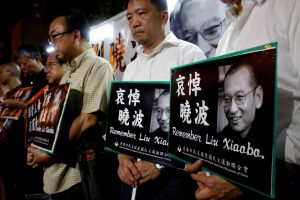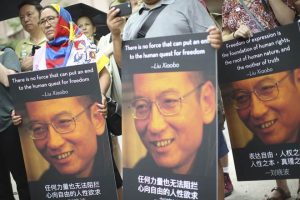
Liu Xiaobo
Liu Xiaobo, the Chinese writer, literary critic, human activist and Nobel Peace Prize Laureate, died aged 61 on July 13 in Shenyang hospital in Liaoning province, still under police guard.
Last month, the Chinese government announced that Liu, who was serving an 11-year prison term, was suffering from a late-stage liver cancer and moved him to hospital. Despite international calls for the Chinese Government to release him to enable him to receive treatment overseas, their only response was their standard reply of asking other nations not to interfere in their internal affairs.
Liu, a Chinese dissident who called for political reforms and an end to the Chinese single-party regime, was labeled as a criminal by the Chinese government and jailed repeatedly throughout his life. In 2009 he was sentenced to 11 years for his participation in drafting the Charter 08 manifesto which called for a multi-party democracy in China. The Chinese regime found him of guilty of trying to overthrow the state.He was awarded the Nobel Peace Prize in 2010 while in prison. He is the only Chinese citizen to receive a Nobel Prize while residing in China.
Many in China and the world regard him as a hero and symbol of the human rights struggle in China. His death around the globe as tributes pour in.

Pro-democracy activists mourn the death of Chinese Nobel Peace laureate Liu Xiaobo, outside China’s Liaison Office in Hong Kong, China
Photo: Reuters /Bobby Yip
Hongkongers took to protest outside the central government’s liaison office in the city, crying “Mourn Liu Xiaobo! Free Liu Xia!” referring to the late dissident’s wife who has been under house arrest since 2010.
In China, the coverage on his death has been muted. Even the word “RIP” is being deleted by censors, reports the BBC.
A Facebook post by state media China Daily stated “Liu Xiaobo, a convicted criminal released on medical parole, died of multiple organ failure”.
Tibetans across the world looked up to the Nobel Laureate as the symbol of hope of change in China.
His Holiness the Dalai Lama, also a Nobel Laureate and messenger of peace and non-violence, expressed profound sadness over Liu’s death. “I am deeply saddened to learn that fellow Nobel Laureate Liu Xiaobo has passed away while undergoing a lengthy prison sentence. I offer my prayers and condolences to his wife, Liu Xia and to other members of his family,” said His Holiness. “Although he is no longer living, the rest of us can best pay honor to Liu Xiaobo by carrying forward the principles he has long embodied, which would lead to a more harmonious, stable and prosperous China,” he added.
“My heart breaks to hear of Liu Xiaobo’s passing. I, on behalf of Tibetans inside and outside Tibet, offer my condolence and wish his wife Liu Xia much strength and resolve in these difficult times,” said Dr Lobsang Sangay, the President of Central Tibetan Administration in exile.

Photo: Reuters
Liu, who was then a university professor, played a significant role during the Tiananmen Square student protest of June 1989 that ended in bloodshed. He was credited for saving many protestors during the protest by negotiating with the army for a peaceful end to the situation.
In a Facebook post, Tiananmen Square survivor and Chinese activist Rose Tang shared her grief,“Teacher Liu, I’ll never forget that you saved my life and the lives of thousands of others in Tiananmen Square on June 4, 1989. When I thanked you during a phone interview in 2004, you said humbly, stuttering: “Don’t don’t thank me.”
The Norwegian Nobel Committee said that China bears a “heavy responsibility” for the death of Liu Xiaobo. The Committee’s statement assured that “Liu Xiaobo will remain a powerful symbol for all who fight for freedom, democracy, and a better world”.
The late dissident was born on December 28, 1955 in Changchun, Jilin and is survived by his wife, the poet Liu Xia, who has been living under house arrest since 2010.




 Print
Print Email
Email